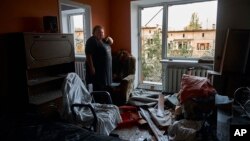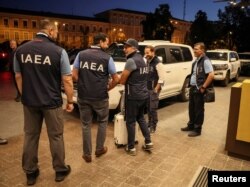For full coverage of the crisis in Ukraine, visit Flashpoint Ukraine.
The latest developments in Russia’s war on Ukraine. All times EDT.
10:15 a.m.: The Joint Communications Center has approved four more vessels from Ukraine. The four commercial ships will carry a total of 125,380 metric tons of grain and other food.
They are: the Eneida, from Chornomorsk to Turkey, carrying 35,470 metric tons of wheat and 8,560 metric tons of corn; the Massa J, from Yuzhny/Pivdennyi, carrying 28,500 metric tons of wheat; the Helga, from Odesa to Turkey, carrying 27,000 metric tons of corn and the Daytona Dynamic, from Odesa to Turkey, carrying 25,850 metric tons of corn.
They'll move Thursday. Two more vessels, which had been scheduled to leave Wednesday, were delayed and will also move Thursday. They are the Afanasiy Matyushenko, from Chornomorsk to Tekirdag, Turkey, carrying 3,000 metric tons of wheat and the Hazar S, from Chornomorsk to Bandirma, Turkey, carrying 5,500 metric tons of corn.
9:13 p.m.:
8:05 p.m.: A rapid deployment team of FBI cyberexperts is heading to Montenegro to investigate a massive and coordinated attack on the Balkan nation's government and its services, Radio Free Europe/Radio Liberty reported.
“This is another confirmation of the excellent cooperation between the United States of America and Montenegro and proof that we can count on their support in any situation,” Montenegro's Ministry of Internal Affairs said on August 31.
On August 26, a high-ranking source with Montenegro's National Security Agency (ANB) told RFE/RL's Balkan Service that "critical state infrastructure" was targeted in the early-morning cyberattack and that Russian security services were suspected of involvement.
7 p.m.: Hungary said Wednesday that Russian energy giant Gazprom will further increase natural gas deliveries to the EU member in September and October, Agence France-Presse reported.
The announcement by Hungarian Foreign Minister Peter Szijjarto comes as Moscow has reduced or halted deliveries to most European nations that have placed sanctions on Russia over its invasion of Ukraine, sending both gas and energy prices soaring.
Following a July visit to Moscow by Szijjarto, Gazprom supplied Hungary with an additional volume of 2.6 million cubic meters per day in August "above the already contracted quantities."
The additional volume "is now increased to 5.8 million cubic meters (per day) from September 1st," Szijjarto said on his Facebook page.
6:12 p.m.: Sweden has sent to Ukraine a new defense aid package containing artillery rounds, Ukrainian Defense Minister Oleksii Reznikov said on Wednesday.
"Great news from Sweden: 7th military package with artillery ammo will strengthen #UAarmy," Reznikov wrote on Twitter, thanking Sweden's foreign and defense ministers. "Together we will restore peace and security in Europe," he added.
4:45 p.m.: Kyiv adds venues to its wartime curfew, which is 11 p.m.- 5 a.m.
3:55 p.m.: U.N. inspectors said Wednesday they would seek to establish a permanent presence at a Russian-held plant in southern Ukraine to avoid "a nuclear accident" at the facility on the frontline of the fighting, Agence France-Presse reported.
The 14-strong team from the International Atomic Energy Agency (IAEA) is expected to arrive at the Zaporizhzhia nuclear plant on Thursday, which is in Russian-held territory.
"My mission is ... to prevent a nuclear accident and preserve the largest nuclear power plant in Europe," IAEA director general Rafael Grossi told reporters after traveling from Kyiv to the city of Zaporizhzhia.
"We are preparing for the real work which begins tomorrow," he said. "We are going to try to establish a permanent presence for the agency."
3 p.m.: Estonia’s foreign minister says his country plans to take steps in coming weeks that will ban most Russians from entering the country.
Foreign Minister Urmas Reinslau spoke to Reuters news agency in Prague after a two-day meeting with European Union counterparts.
The ministers refrained from implementing an EU-wide visa ban for Russians proposed by Ukraine. However, Reinslau suggested Wednesday that Estonia and other counties which share land borders with Russia are likely to take measures of their own.
He said action was needed on national security grounds, given what he called "the vast number of Russian citizens" entering Estonia. The foreign minister said that since the start of Russia’s invasion of Ukraine, 300,000 Russian citizens have entered tiny Estonia, which has population of just 1.3 million.
2:20 p.m.: The British Ministry of Defense says Ukrainian forces have made some gains in a push against the Russian front line in southern Ukraine. In its latest intelligence update Wednesday, the ministry predicts Russia will move in reserve units from eastern Ukraine to solidify the front.
9:55 a.m.: The head of the International Atomic Energy Agency (IAEA) says monitors set to visit a Russian-occupied nuclear power plant in eastern Ukraine are on a “technical mission” aimed at preventing a nuclear accident.
Reuters reports Rafael Grossi talked to reporters as the IAEA team reached the city of Zaporizhzhia, 55 kilometers away from the nuclear plant of the same name.
The plant was occupied by Russian forces in March but is still operating under Ukrainian staff under supervision of Russian troops and nuclear engineers.
9:20 a.m.: Bloomberg reports that international monitors have left Ukraine’s capital, driving east toward a Russian-occupied nuclear power plant that has become a focus of international concern.
The report says the team of International Atomic Energy Agency monitors departed Kyiv early Wednesday in a convoy of white trucks marked with the IAEA logo. They plan to drive at least 10 hours southeast toward Energodar, the city closest to the Zaporizhzhia plant.
It remains unclear when and for how long they will enter the plant, which has two working nuclear reactors.
Attacks in the vicinity of the plant have sparked fears of a potential nuclear disaster. Ukraine and Russia blame each other for the near-daily shelling in the area.
9:05 a.m.: Russia’s state-owned Gazprom has halted the flow of natural gas through the Nord Stream 1 pipeline to Europe, a stoppage it says will last until September 3.
The Associated Press reports that Gazprom gave notice of the stoppage in mid-August, citing the need for maintenance at a compressor station.
Russian authorities have reduced the flow of gas to Europe multiple times in recent months, always citing technical reasons.
Germany, a major customer of Russian gas, has cast doubt on the claims and accuses Russia of retaliating against countries that support Ukraine as it battles invading Russian forces.
Germany and its neighbors, meanwhile, are attempting to build up stocks of natural gas ahead of winter when it will be needed for heating. On Wednesday, AP reports, Germany said its storage facilities are 83 percent full.
5:20 a.m.: Some Northern European Union countries are calling for a broad ban on tourist visas for Russian citizens, calling it a matter of national security, as President Vladimir Putin's war against Ukraine drags on. But, as The Associated Press reports, other EU countries like France, Germany and Belgium want to avoid punishing Russians who may oppose the war or need to enter Europe for humanitarian purposes. Amid the divisions, it appears likely that they'll only agree to make it more time-consuming and costly for Russians to apply for tourist visas.
4:46 a.m.: Russia halted gas supplies via Europe's key supply route on Wednesday, Reuters reported. The move intensifies an economic battle between Moscow and Brussels and raising the prospects of recession and energy rationing in some of the region's richest countries.
European governments fear Moscow could extend the outage in retaliation for Western sanctions imposed after it invaded Ukraine and have accused Russia of using energy supplies as a "weapon of war". Moscow denies doing this and has cited technical reasons for supply cuts.
2:06 a.m.: Ukrainian President Volodymyr Zelenskyy met US Senators Rob Portman and Amy Klobuchar in Kyiv on Tuesday, The Associated Press reports.
Zelenskyy said he believed the sanctions policy to be working, "but it has not yet worked to the full", he said, adding that "it has a snowball effect and then will influence and hit the economy of the Russian Federation, a terrorist state."
At the end of the meeting, the Ukrainian leader awarded the senators with Distinguished Service medals.
1:06 a.m.: Even as the war goes on, routine immunizations are needed.
12:15 a.m.: Nations bordering the Baltic Sea agreed Tuesday to increase offshore wind energy to 20 gigawatts by 2030, as Europe seeks to wean itself off Russian gas following Moscow's invasion of Ukraine, Agence France-Presse reported.
Twenty gigawatts would be enough to supply electricity to 20 million households, "more than the current wind offshore capacity in the whole of the EU today," Danish Prime Minister Mette Frederiksen told reporters after hosting a meeting between Denmark, Estonia, Finland, Germany, Latvia, Lithuania, Poland and Sweden.
Russia was the only Baltic Sea nation not in attendance at Tuesday's meeting.
12:00 a.m.: Alexey Navalny, the imprisoned Russian opposition politician, says he has been sent to solitary confinement for the third time this month as a punishment for his political activities, Radio Free Europe/Radio Liberty reported.
Navalny, who is being held at a facility about 260 kilometers east of Moscow, made the statement on Instagram on August 30 most likely via his team members.
"The thing is, I'm too politically active for an inmate. They are very irritated by the labor union I have created. ... And what really drives the Kremlin mad is [our team's] work on pushing the list of 6,000 oligarchs, corrupt officials, and warmongers who will be slapped with [international] sanctions," Navalny wrote.
The punishment comes a day after Navalny's team published its latest list of Russian officials, journalists, and celebrities, who, according to the group, are "directly responsible" for Russia's unprovoked invasion of Ukraine launched in late February.
Some information in this report came from The Associated Press, Reuters and Agence France-Presse.






